
Edna Ferber was an American novelist, short story writer and playwright. Her novels include the Pulitzer Prize-winning So Big (1924), Show Boat, Cimarron, Giant and Ice Palace (1958), which also received a film adaptation in 1960. She helped adapt her short story "Old Man Minick", published in 1922, into a play (Minick) and it was thrice adapted to film, in 1925 as the silent film Welcome Home, in 1932 as The Expert, and in 1939 as No Place to Go.

Cimarron is a novel by Edna Ferber, published in April 1930 and based on development in Oklahoma after the Land Rush. The book was adapted into a critically acclaimed film of the same name, released in 1931 through RKO Pictures. The story was again adapted for the screen by Metro-Goldwyn-Mayer and was released in 1960, to meager success.
Doubleday is an American publishing company. It was founded as the Doubleday & McClure Company in 1897. By 1947, it was the largest book publisher in the United States. It published the work of mostly U.S. authors under a number of imprints and distributed them through its own stores.
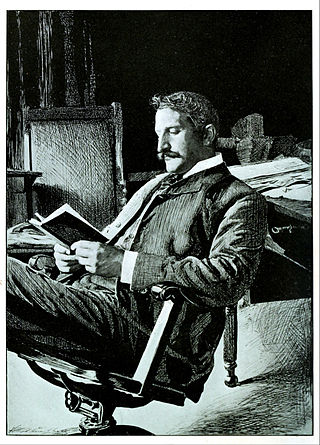
Frank Nelson Doubleday, known to friends and family as "Effendi", founded the Doubleday & McClure Company in 1897, which later operated under other names. Starting work at the age of 14 after his father's business failed, Doubleday began with Charles Scribner's Sons in New York.

The Royal Family is a play written by George S. Kaufman and Edna Ferber. Its premiere on Broadway was at the Selwyn Theatre on 28 December 1927, where it ran for 345 performances to close in October 1928. It was included in Burns Mantle's The Best Plays of 1927–1928.

Nelson Doubleday was a U.S. book publisher and president of Doubleday Company from 1922–1946. His father Frank Nelson Doubleday had founded the business. His son Nelson Doubleday Jr. followed him into it, taking part in expansion and serving as president from 1978–1986.
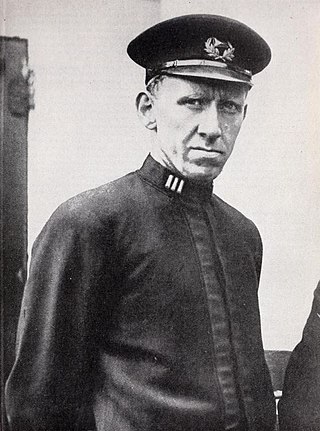
William Morley Punshon McFee was an English writer of sea stories. Both of his parents were Canadian.

So Big is a 1924 novel written by Edna Ferber. The book was inspired by the life of Antje Paarlberg in the Dutch community of South Holland, Illinois, a Chicago suburb. It was a best-seller in the United States and won the Pulitzer Prize for the Novel in 1925.
"Break a leg" is an English language idiom used in the theatre or other performing arts to wish a performer "good luck". An ironic or non-literal saying of uncertain origin, "break a leg" is commonly said to actors and musicians before they go on stage to perform or before an audition. Though the term likely originates in German, the English expression is first attributed in the 1930s or possibly 1920s, originally documented without specifically theatrical associations. Among professional dancers, the traditional saying is not "break a leg", but the French word merde
The Betsy-Tacy books are a series of semi-autobiographical novels by American novelist and short-story writer Maud Hart Lovelace (1892-1980), which were originally published between 1940 and 1955 by the Thomas Y. Crowell Co. The books are now published by HarperCollins. The first four books were illustrated by Lois Lenski and the remainder by Vera Neville.
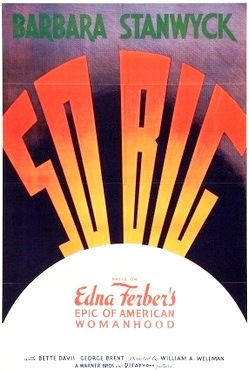
So Big is a 1932 pre-Code American drama film directed by William A. Wellman and starring Barbara Stanwyck. The screenplay by J. Grubb Alexander and Robert Lord is based on the 1924 Pulitzer Prize-winning novel of the same name, by Edna Ferber.

Show Boat is a 1926 novel by American author and dramatist Edna Ferber. It chronicles the lives of three generations of performers on the Cotton Blossom, a floating theater on a steamboat that travels between small towns along the banks of the Mississippi River, from the 1880s to the 1920s. The story moves from the Reconstruction Era riverboat to Gilded Age Chicago to Roaring Twenties New York, and finally returns to the Mississippi River.
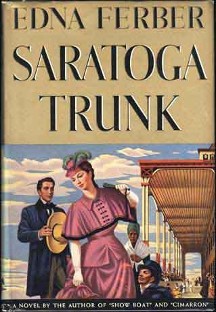
Saratoga Trunk is a best-selling novel by American author Edna Ferber, originally published by Doubleday, Doran in 1941.
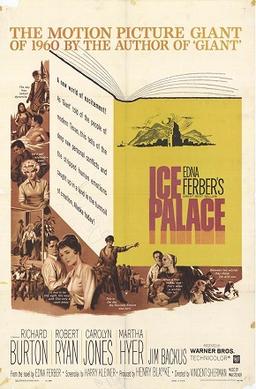
Ice Palace is a 1960 Technicolor historical drama adventure film directed by Vincent Sherman and adapted from a novel of 1958 written by Edna Ferber. The film stars Richard Burton, Robert Ryan, Carolyn Jones and Martha Hyer. It dramatizes the debate over Alaska statehood. Alaska had become a state in 1959.

The Temple Zion and School is a former Jewish synagogue located at 320 North Durkee Street, and a Jewish day school located at 309 East Harris Street, both in Appleton, Wisconsin, in the United States. The synagogue was built in 1883 and was subsequently used as a church from 1932 until 1977; when it was sold to the Outagamie County Historical Society for use as a history museum. In 1999 the former synagogue and school were acquired by interested associated with the Wahl family.
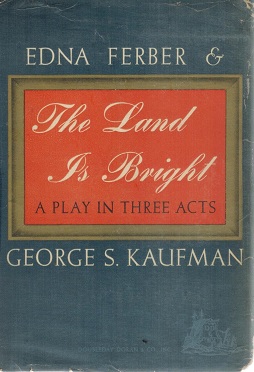
The Land Is Bright is a 1941 dramatic play by George S. Kaufman and Edna Ferber.
Margueritte Harmon Bro was an American minister, missionary in China, and author of books. Her article about the American seer Edgar Cayce, "Miracle Man of Virginia Beach," published in the magazine Coronet in 1943, resulted in a deluge of inquiries to the magazine and to Cayce. Bro's books were reviewed by scholarly journals and one of her books was recommended to be used in elementary schools by the Arkansas Department of Education.
Norman Beasley was an American journalist and author, best known for writing biographies. He also served in the United States Army as a colonel.
"Old Man Minick" is a short story by American author Edna Ferber first published in 1922. It was adapted into Minick, a Broadway play staged in 1924, as well as the 1925 silent film Welcome Home, the 1932 film The Expert, and the 1939 film No Place to Go.

Minick is a three-act Broadway play written by Edna Ferber and George S. Kaufman, based on Ferber's 1922 short story "Old Man Minick", that opened on September 24, 1924. Producer Winthrop Ames staged it at the Booth Theatre on Broadway, with O. P. Heggie in the title role. The play is about an elderly widower who comes to live with his son and daughter-in-law in their Chicago apartment.














